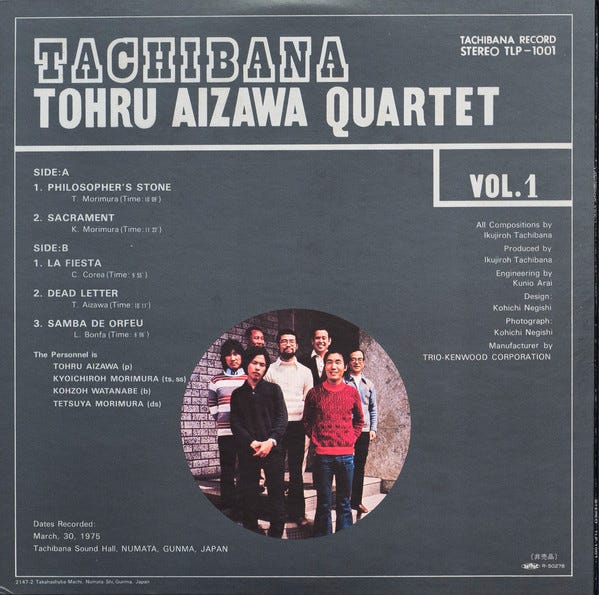Graydon Gordian | February 6, 2025
The Tachibana Edition
On obscure records, alternative business cards, and the Tohru Aizawa Quartet.
Graydon Gordian (GG) is the founder of the Backyard Care Company. He’s written several WITIs, a few of which are on jazz if you are into that sort of thing.
Graydon here. When I’m traveling, I often visit a local record store and pick up an album or two. It’s a nice way of being periodically reminded of my trip. It doesn’t have to be something strongly connected to the place. In fact, it might have no connection to the city whatsoever, except that now when I listen to the album, I think about where I bought it. But I have a rule: I only buy used records (unless an album is brand new or recent enough that realistically there won’t be any used copies circulating). It’s a self-imposed constraint that makes the hunt for treasured albums more fun. I’ve had dozens of chances to buy a fresh reissue of Kind of Blue, but foregoing those opportunities made finding a first pressing of the album in a record store in Burlington, Vermont all the more special. Not every album needs to be a first pressing; I simply prefer not to be its first owner.
But on a recent trip to London I was reminded that even fairly straightforward rules are not always so black and white. I was in Flashback Records, a store in Shoreditch, when I came across Tachibana, a 1975 album by the Tohru Aizawa Quartet. This specific copy was a reissue from 2018. Technically it was used, but that’s a fairly recent reissue. It felt a bit against the spirit if not the letter of my rule. Regardless, I snatched it up immediately because Tachibana is not just any record.
Why is this interesting?
If you’ve never heard of the Tohru Aizawa Quartet, don’t worry. No one expects you to be familiar with a group of student musicians from the 1970s who played small town gigs in Japan’s Gunma prefecture and made exactly one album. The fact that I was even vaguely aware of it is somewhat of a miracle. It was practically forgotten for decades, if you can even say it was ever known in the first place. But at some point its obscurity transformed into mystique, driven by the unlikely circumstances behind its recording and the unique use it was intended for.
Here’s Vinyl Factory on the story behind one of jazz’s most elusive albums:
Kyoichiroh Morimura was a saxophonist and music student who later became a teacher, and Tetsuya Morimura was a drummer and law student. A few years younger than pianist Tohru Aizawa, they joined forces after hearing Aizawa perform at a music festival held in the medical school in Maebashi. (Aizawa, born in 1950, had moved there from Tokyo to study medicine. He would eventually graduate top of his class). Suitably impressed by Aizawa’s skills on the keys, the Morimura brothers decided to form a group and were joined by bass player Kohzoh Watanabe, a fellow law student of Tetsuya Morimura.
They began gigging at local jazz spots, gaining something of a residency at Mokuba, a jazz spot in Maebashi owned by Kohichi Negishi. It was here that the group built a small but loyal following, among them local businessman and jazz fanatic, Ikujiroh Tachibana. He suggested that they make a record and he would finance it. Moreover, he would use the finished LP as a business card to promote himself and the band.
Somewhere between 150 and 200 copies were made, most of which were apparently handed out by Tachibana to the types of people we connect with on LinkedIn nowadays.
The other thing that makes this album special is the quality of the music itself. It’s terrific. That’s a bit surprising because, again, we are talking about an album made by a bunch of students who only recorded together once and all went on to become professionals in something other than music. The sophistication of their compositions and the capable way they move across styles clearly demonstrate their precociousness. These kids could really play.
I had never actually listened to the album until I bought the record earlier this week. But you don’t have to wait until you stumble across a physical copy. Listen and enjoy. (GG)
